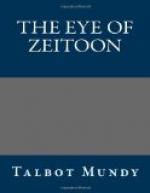Rustum Khan rattled the saber that lay on the rock beside him.
“I am hunting for fear,” he said. “All my life I have hunted for fear and never found it!”
“Pekki!” said Ibrahim dryly. The word means “very well.” The tone implied that when the emergency should come we should do well not to depend on him, for he had warned us.
We were marching about parallel with the course the completed Baghdad railway was to take, and there were frequent parties of surveyors and engineers in sight. Once we came near enough to talk with the German in charge of a party, encamped very sumptuously near his work. He had a numerous armed guard of Turks.
“A precaution against robbers?” Monty asked, and I did not hear what the German answered.
Rustum Khan laughed and drew me aside.
“Every German in these parts has a guard to protect him from his own men, sahib! For a while on my journey westward I had charge of a camp of recruited laborers. Therefore I know.”
The German was immensely anxious to know all about us and our intentions. He told us his name was Hans von Quedlinburg, plainly expecting us to be impressed.
“I can direct you to good quarters, where you can rest comfortably at every stage, if you will tell me your direction,” he said.
But we did not tell him. Later, while we ate a meal, he came and questioned our Turks very closely; but since they were in ignorance they did not tell him either.
“Why do you travel with Armenian servants?” he asked us finally before we moved away.
“We like ’em,” said Monty.
“They’ll only get you in trouble. We’ve dismissed all Armenian laborers from the railway works. Not trustworthy, you know. Our agents are out recruiting Moslems.”
“What’s the matter with Armenians?”
“Oh, don’t you know?”
“I’m asking.”
The German shrugged his shoulders.
“I’ll tell you one thing. This will illustrate. I had an Armenian clerk. He worked all day in my tent. A week ago I found him reading among my private papers. That proves you can’t trust an Armenian.”
“Ample evidence!” said Monty without a smile, but Fred laughed as we rode away, and the German stared after us with a new set of emotions pictured on his heavy face.
Late in the afternoon we passed through a village in which about two hundred Armenian men and women were holding a gathering in a church large enough to hold three times the number. One of them saw us coming, and they all trooped out to meet us, imagining we were officials of some kind.
“Effendi,” said their pastor with a trembling hand on Monty’s saddle, “the Turks in this village have been washing their white garments!”
We had heard in Tarsus what that ceremony meant.
“It means, effendi, they believe their purpose holy! What shall we do—what shall we do?”




